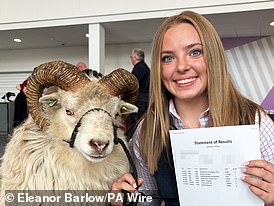Britain’s strictest head teacher is celebrating record GCSE results for her pupils in one of London’s most deprived boroughs.
Katharine Birbalsingh said her outstanding results were ‘social mobility at its best’ as her students beat the odds.
Every pupil at Michaela Community School in Wembley passed both English and maths with grade 4 and above – for the first time ever.
In addition, an incredible 80 per cent of all GCSE grades at the school were 7 to 9 -equivalent to the old A-A*.
And nearly 40 per cent achieved five or more grade 9s.
Despite serving one of London’s most deprived communities, Michaela consistently beats those serving the most privileged.
Last year, it had the country’s top ‘Progress 8’ score – measuring how well pupils do compared with prior attainment.
Its success has been attributed to its tough discipline, ‘no excuses’ approach, with all new students taking part in a behaviour ‘boot camp’.
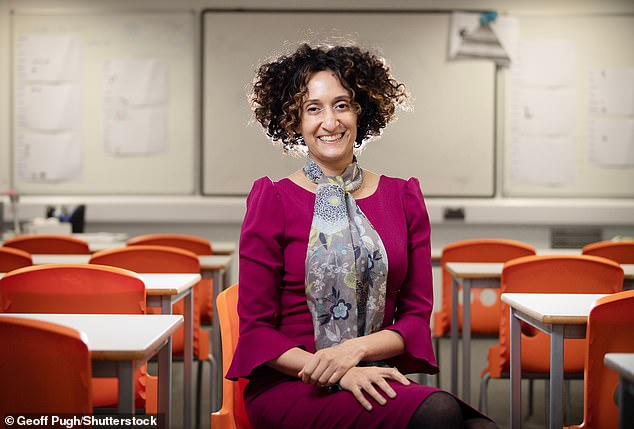
Britain’s strictest head teacher is celebrating record GCSE results for her pupils in one of London ’s most deprived boroughs (pictured: Katharine Birbalsingh)
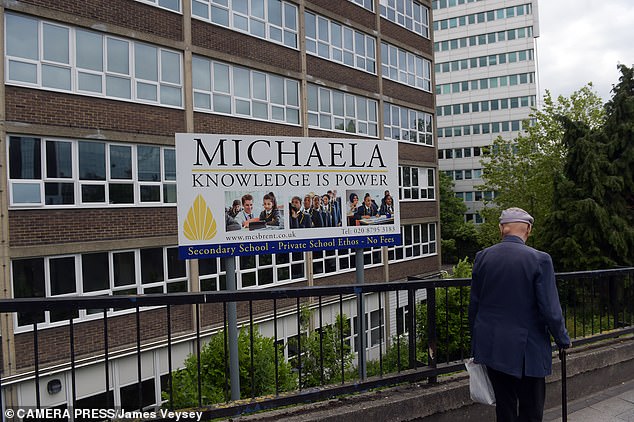
Every pupil at Michaela Community School in Wembley (pictured) passed both English and maths with grade 4 and above – for the first time ever

Michaela posted on its official X account a student delighted with his results

A student celebrates his results
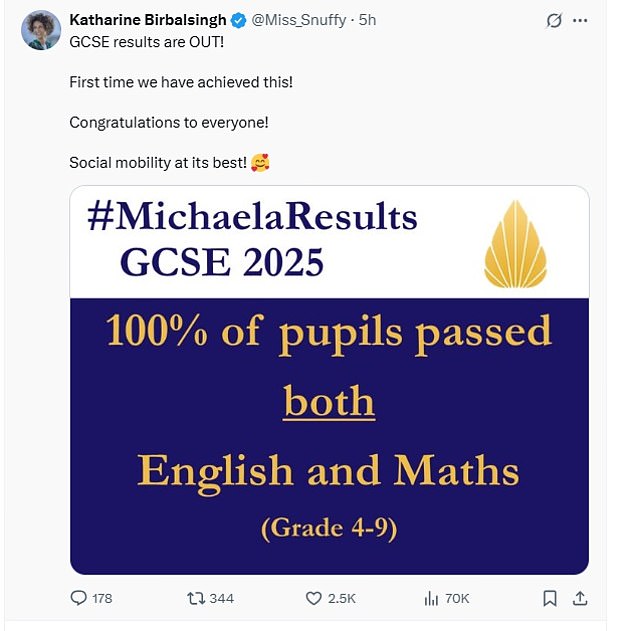
Katharine Birbalsingh posted her pupils’ success on X
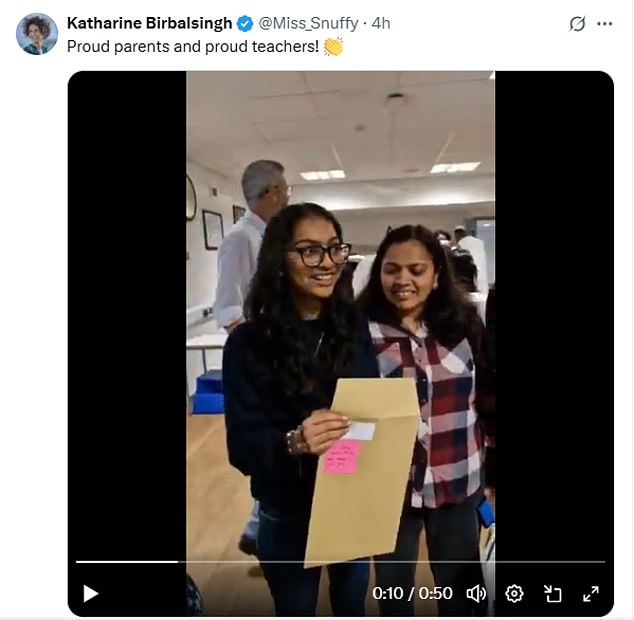

Miss Birbalsingh has accused the Government of ‘Marxism’ this year following a move to curb the freedoms of academies like hers.
Posting her maths and English results on X this morning, she said: ‘GCSE results are OUT! First time we have achieved this! Congratulations to everyone! Social mobility at its best!
‘Just so lovely… kids at all levels achieving well beyond what the stats say they should get! Michaela is a special place.’
She later said: ‘We are so happy for the children. They are delighted with their results – GCSEs open so many doors for them. This is always the most exciting time of the year for our kids. All that we stand for – working hard and persevering, even when it is difficult – pays off now.’
She also posted that 99 per cent of all GCSE grades were 4 to 9, equivalent to C to A* under the old system. And 97 per cent were 5 to 9.
It came as pupils across the country were yesterday celebrating another top grades bonanza as one in five GCSE entries got at least a grade 7 or A following a rise on last year.
However, nationwide, the GCSE pass rate for English and maths has hit a record low, amid fears that some pupils are being left behind.
This morning, Bridget Phillipson, the Education Secretrary, said white working class children in particular were some of the least likely to hit these targets.
She said they have been ‘let down’ as previous analysis shows four fifths of this demographic fall short in the two core subjects.
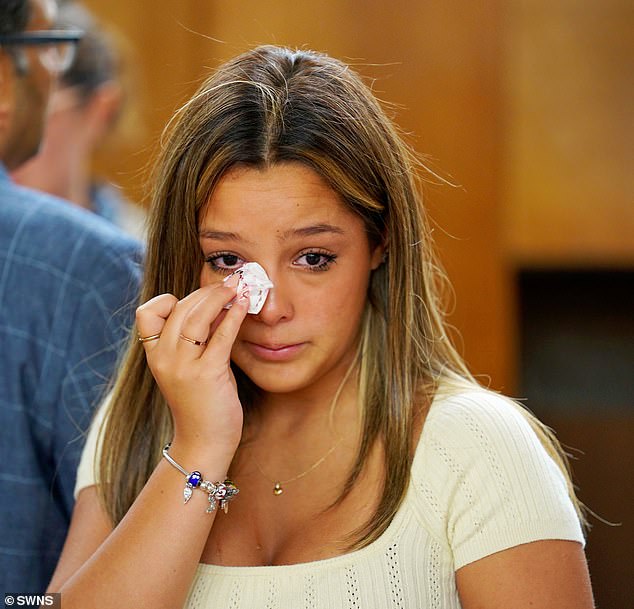
Tears of joy as students receive their GCSE results at Nottingham High School in Nottingham
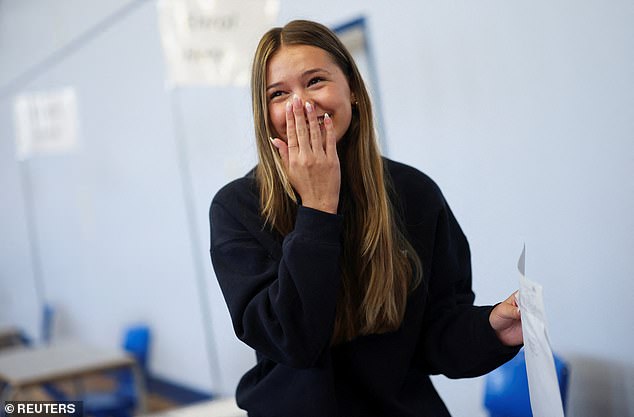
Amelia Mrozek, 15, a student at Harris Academy Merton, reacts as she collects her GCSE results
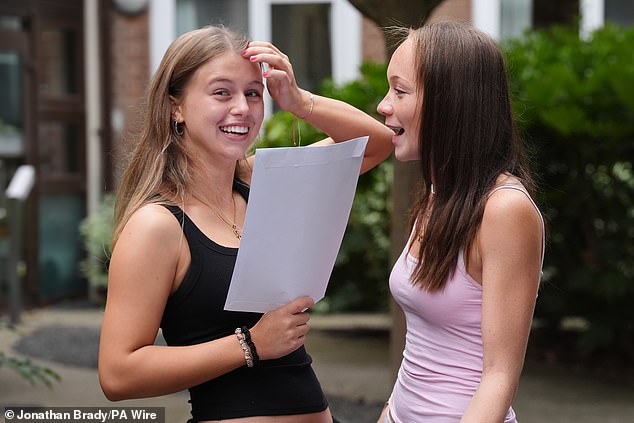
Nathalie Endemann, 16, who achieved 14 9s and Isla Knowles, 16, who achieved 11 9s, receiving their GCSE results at Putney High School in London
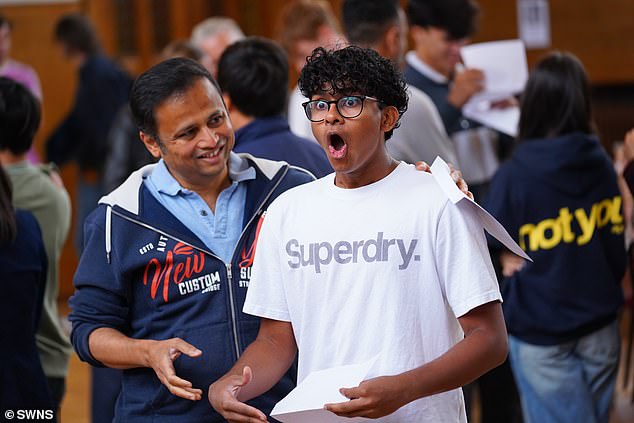
Students receive their GCSE results at Nottingham High School in Nottingham
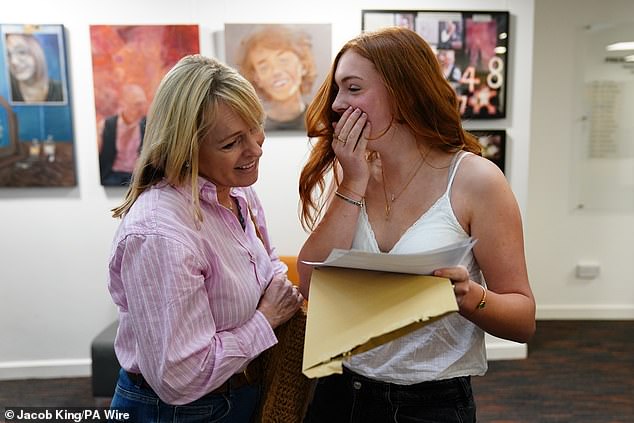
Pupils at Solihull School in Solihull, West Midlands, open their results
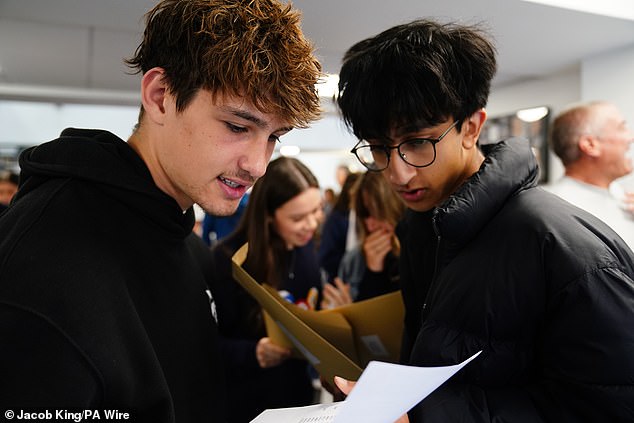
Pupils arrive at Solihull School in Solihull, West Midlands
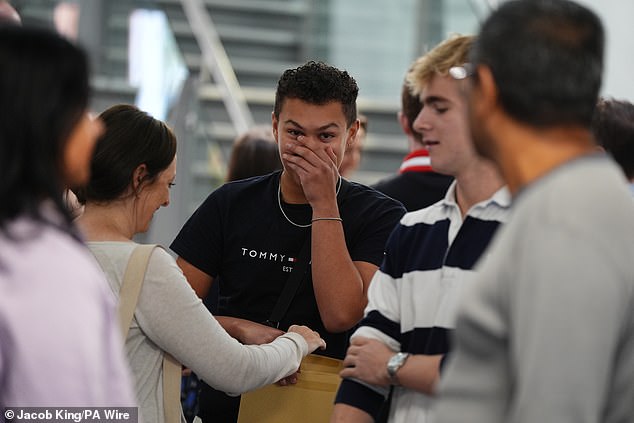
Teachers welcome pupils at Solihull School, Solihull, West Midlands
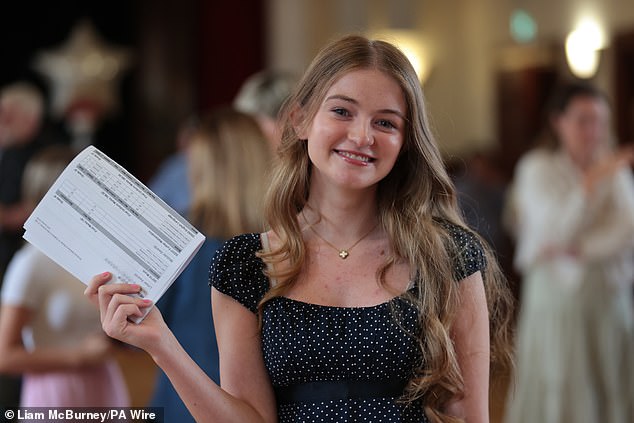
Julia Hagarty at St Dominic’s in Belfast receiving her GCSE results
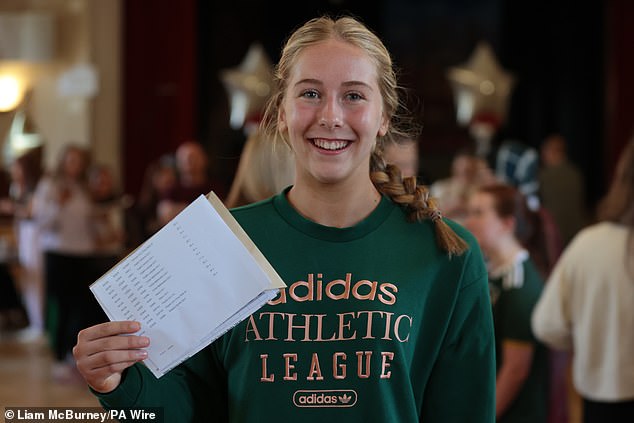
Anna Rice at St Dominic’s in Belfast receiving her GCSE results
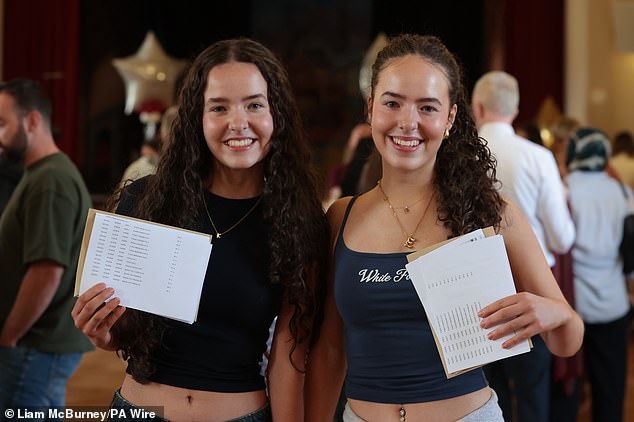
Twins Kate and Emily Fanning at St Dominic’s in Belfast
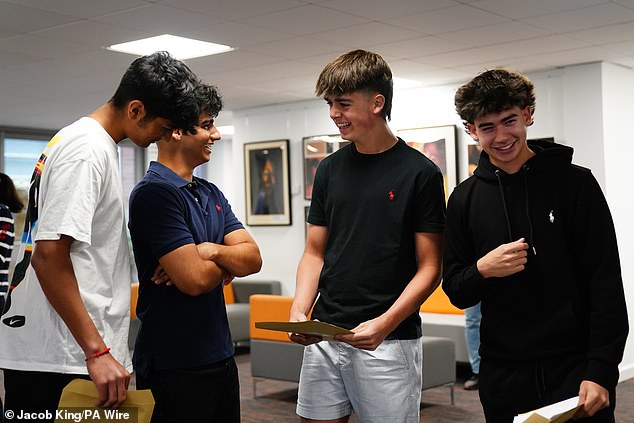
Pupils gather to collect their results at Solihull School in Solihull, West Midlands
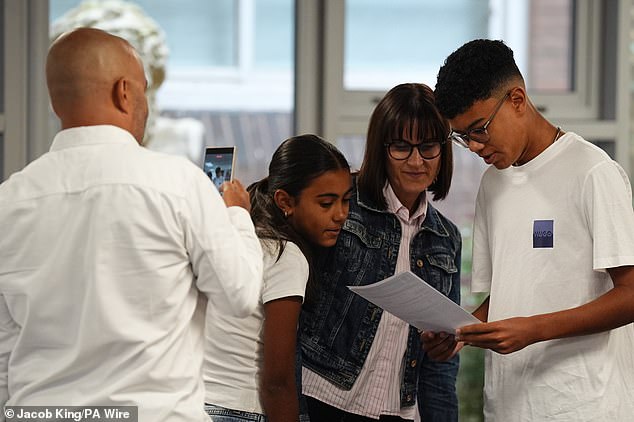
Proud parents join pupils at Solihull School in Solihull, West Midlands
Hundreds of thousands of pupils are travelling to schools today to collect their GCSE results.
For all pupils of all demographics, the proportion getting top marks in England is the highest since 2012 outside of the abnormal pandemic years – while for the UK it is the highest in two years.
It was good news for boys, who have been behind girls in getting top grades since the 1980s, but narrowed the gap this year.
However, the explosion of top grades means competition will be rife for sixth form places, especially at the most selective institutions.
Ofqual, the regulator for England, insisted the change was not significant and that results are ‘stable’.
But critics suggested the results show grade inflation may be making a come-back, following years of attempts to suppress it.
Alan Smithers, professor of education at the University of Buckingham, said: ‘Top grades are up again, small percentage, but an extra 6,160 on last year and nearly 70,000 more than the 2019 level, even though the education of the young people has been so disrupted.
‘It has to be a shift in standards by the exam boards and regulators.’
Grade 7 in England is equivalent to the old A, which is still used in other UK nations, which have different systems.
Today’s figures show the proportion of entries across the UK getting A/7 rose for a second year running by 0.1 percentage point from 21.8 to 21.9.
This is not as high as 2023 but is higher than 2019, before the pandemic, when it was 20.8.
For England only, grades also rose by 0.1 percentage point from 21.7 to 21.8.
Discounting the pandemic years of 2020-2022, when grades were wildly inflated due to teachers deciding marks, this is the highest proportion since 2012.
Today’s figures, published by the Joint Council for Qualifications (JCQ), cover GCSE entries from students in England, Wales and Northern Ireland.
Despite the good news for top grades, there was a decrease in those getting the more average grades.
The proportion of entries getting at least a 4 or a C grade – considered a ‘standard pass’ – fell from 67.6 per cent in 2024 to 67.4 pe cent this year – a drop of 0.2 percentage points, but higher than 67.3 percent in 2019.
And this year boys made a surprise leap forward having been consistently behind girls since 1989.
They are still behind in terms of getting top grades, but the gap them and girls is at the narrowest point this century.
Nearly a quarter – 24.5 per cent – of girls’ GCSE entries were awarded at least a grade 7/A compared to almost a fifth of boys’ entries – 19.4 per cent – a 5.1 percentage point gap.
This is the narrowest lead enjoyed by girls since at least 2000, which is the earliest archive data available.
Meanwhile, 70.5 per cent of girls’ GCSE entries were awarded at least a grade 4/C compared to 64.3 per cent of boys’ entries – a 6.2 percentage point gap.
The overall rate for grades 1/G or above is 97.9 per cent, which is the same as 2024 but is down on 98.3 per cent in 2019.
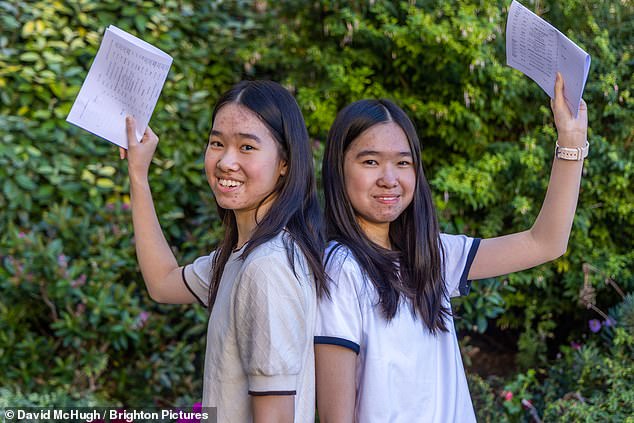
Identical twins Natalie and Constance Kwok at Roedean School in East Sussex landed 20 grade 9s between them
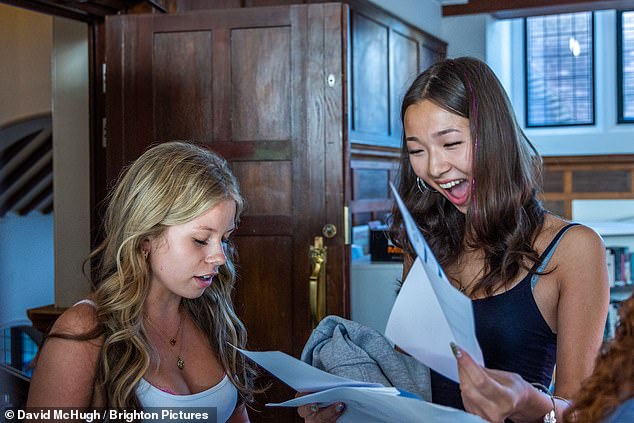
Pupils open their results at Roedean School in East Sussex
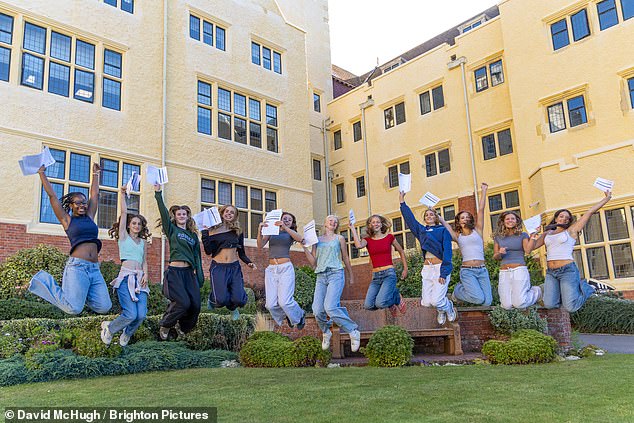
Pupils celebrate at Roedean School in East Sussex
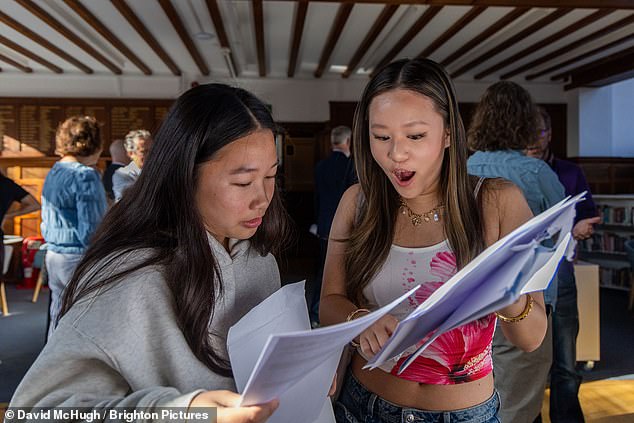
Roedean pupils open their results
Sir Ian Bauckham, chief regulator at Ofqual, England’s exams regulator, said this year’s GCSE results are ‘stable’ in comparison to the past two years – when grading returned to pre-pandemic levels in England.
He said the differences this year are ‘natural variation’ that would be seen between any year.
Sir Ian said: ‘The standard of work required to achieve a grade seven or a grade four at GCSE is the same this year as it was last year, and what we’re seeing is statistically insignificant changes at those key grades from last year to this year.
‘That means basically that the underlying pattern, the underlying standard of performance amongst students from last year to this year, is stable.’
On the gender gap, Sir Ian added: ‘What we see today in the results is a very small apparent narrowing of the gap in performance between boys and girls.
‘It’s important for people to understand that there is still a gap in the performance of boys and girls, but what we can say is that it doesn’t appear to be growing at the moment.’
In England, Ofqual brought GCSE grading standards back in line with pre-Covid levels in 2023 and exam regulators in Wales and Northern Ireland returned to pre-pandemic grading last year.
The move came after Covid-19 led to an increase in top GCSE grades in 2020 and 2021, with results based on teacher assessments instead of exams.
Many of the pupils who are receiving their GCSE results this summer were in Year 6 when schools closed because of the pandemic.
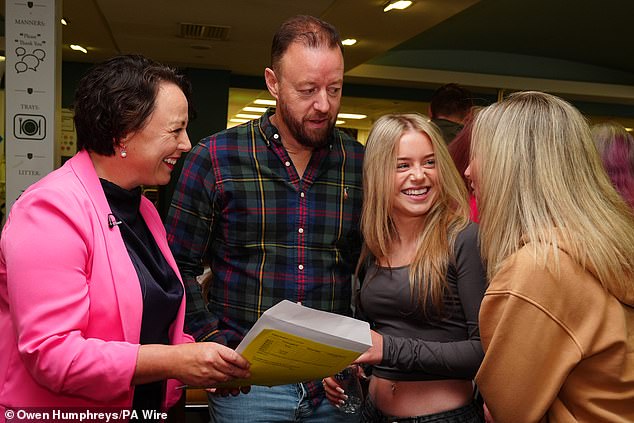
Schools minister McKinnell visits pupils at Bede Academy in Blyth
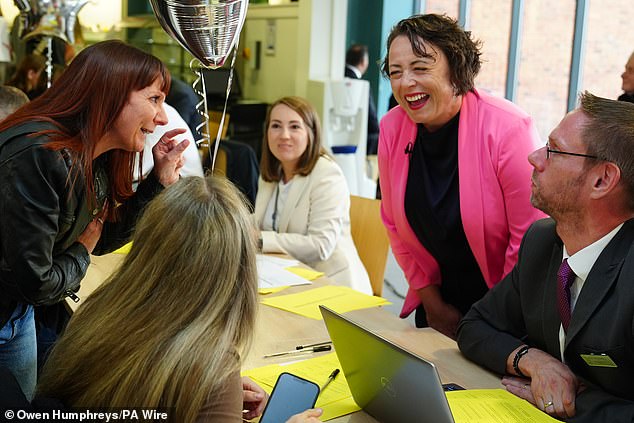
Schools minister McKinnell visits pupils at Bede Academy in Blyth
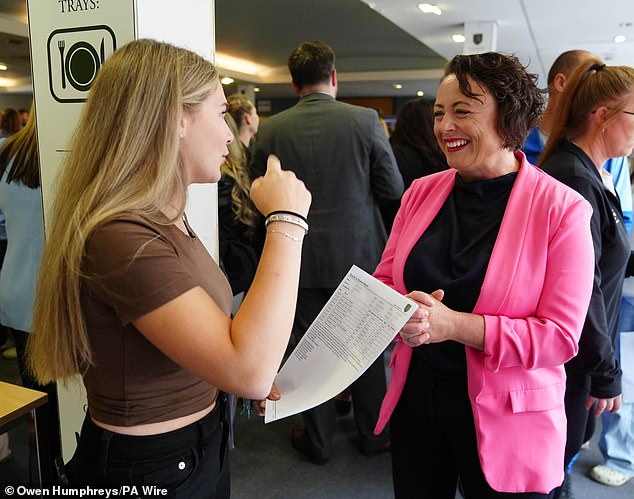
Schools minister McKinnell visits pupils at Bede Academy in Blyth
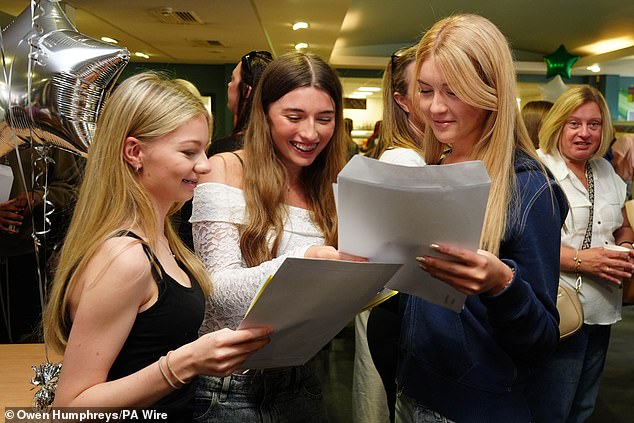
Pupils at Bede Academy in Blyth open their results
Education leaders have warned that these pupils, who moved from primary to secondary school in the middle of the pandemic, have faced a series of challenges – including school attendance issues and cost-of-living pressures.
Education Secretary Bridget Phillipson said this cohort of students had shown ‘remarkable resilience’ despite the disruption to their education.
However, today’s data shows just 58.3 per cent of all pupils across the UK passed their maths GCSE this year, down from 59.5 per cent last year to reach the lowest level since 2013.
Meanwhile, the pass rate for English dropped 1.7 percentage points to hit 60.2 per cent this summer, matching a previous low for the subject in 2016 and marking the worst result since 2004.
Falls in both subjects were driven by a surge in the number of children retaking them and failing aged 17 or over, since pupils that fail are required to resit them if they stay on for sixth form.
Mrs Phillipson warned this morning that failure to ensure children leave school with solid English and maths skills was holding Britain back.
She told the Daily Telegraph: ‘It’s appalling, and I won’t stand by and watch those numbers continue to grow.
‘It’s not just the life chances of those children that are being damaged – it’s also the health of our society as a whole. Swathes of human capability and productivity lost.
‘While this country is a good place to go to school, good isn’t good enough.
‘The images on television and the headline statistics we’ll see this week mask the reality of a system that works for some children – even most children – but continues to let down tens of thousands more.’
Grade 4 is considered a ‘standard pass’ and most jobs in the UK require this for both English and maths GCSE, although some require a ‘strong pass’ of grade 5 in the two subjects.
The level of pupils failing to obtain a grade 4 in both subjects at GCSE has been steadily climbing for more than a decade, creating an explosion in the number of pupils required to resit them and a high failure rate among these children.
Among the 16-year-old population in the UK as a whole, the standard pass rate for English language GCSE was 70.5 per cent this year – down from 71 per cent in 2024.
Similarly, the proportion of pupils aged 16 passing their maths GCSE fell slightly to 71.1 per cent this year, down 0.1 percentage points compared to last year.
But the overall rate was significantly squeezed by drastic pass rates among those retaking the subject aged 17 or over.
Just 23.1 per cent of pupils who resat their English GCSE this year opened their results this morning to receive a standard pass, with the figure dropping to 18.2 per cent for maths.
While the failure rates were broadly similar to 2024, there was a huge surge in the number of children retaking the subjects after failing last summer – up by nearly a fifth for English and by 10.8 per cent for maths.
This meant almost 28,000 extra pupils retaking their English language GCSE this year and 21,000 for maths.
The figrues will again increase pressure on the Government to re-think the resit system.
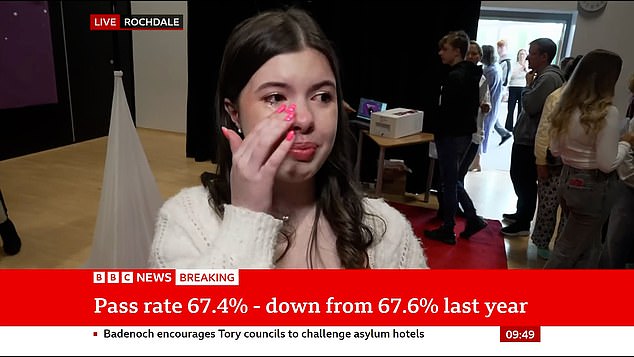
Tears of joy as student reacts live on BBC News
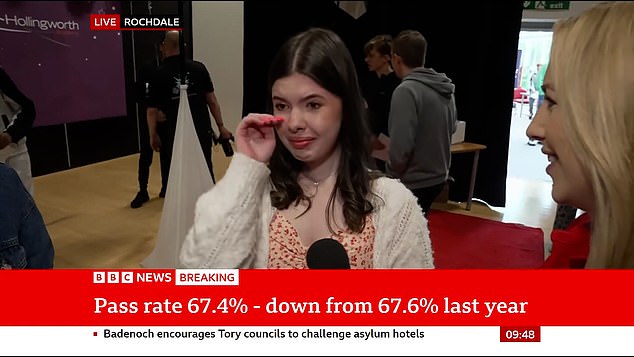
Tears of joy as student reacts live on BBC News
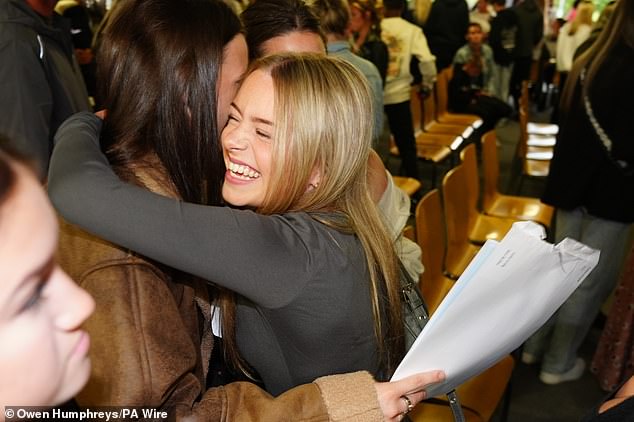
Pupils at Bede Academy in Blyth receiving their GCSE results
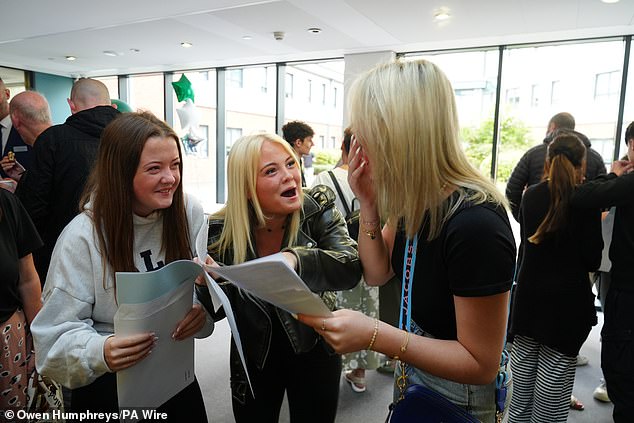
Pupils at Bede Academy in Blyth receiving their GCSE results
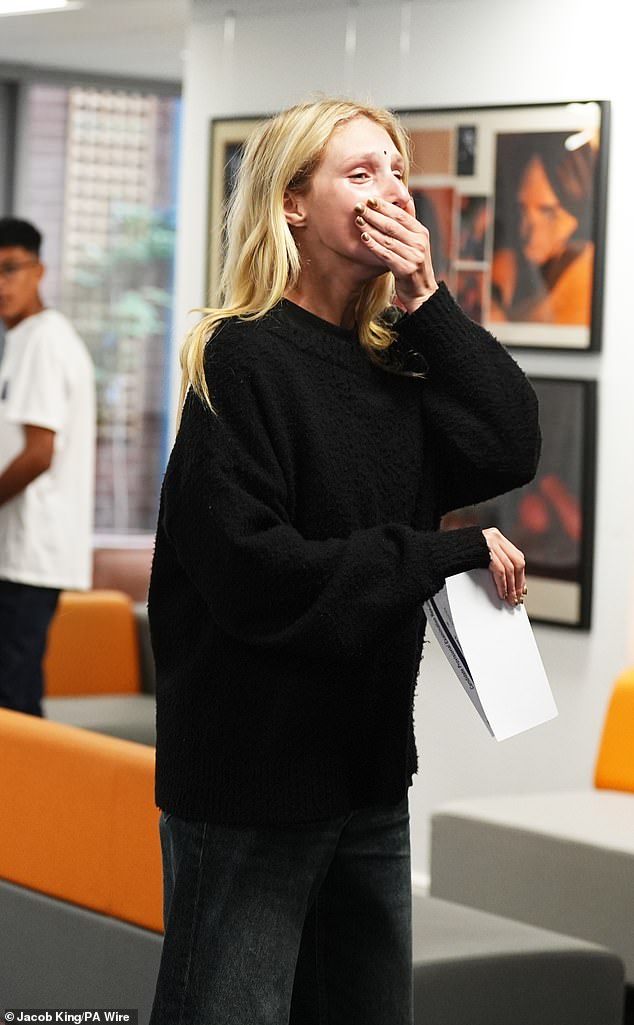
Yeva Kulikova at Solihull School in Solihull receiving her GCSE results
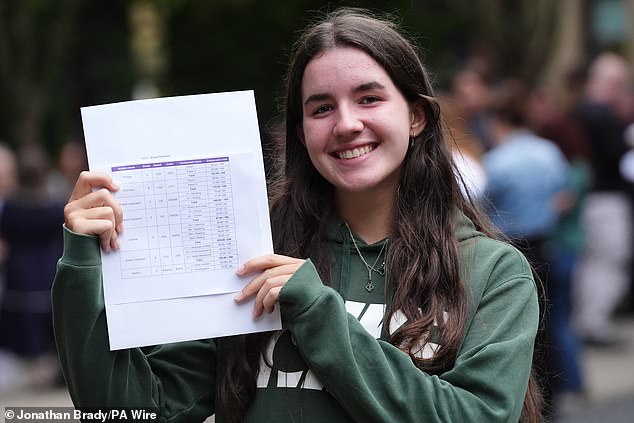
Florence Grose at Putney High School in London receiving her GCSE results, 11 GCSEs, all at grade 9. She combined her studies with her rowing training which saw her selected in the England team for the Home International Rowing Regatta
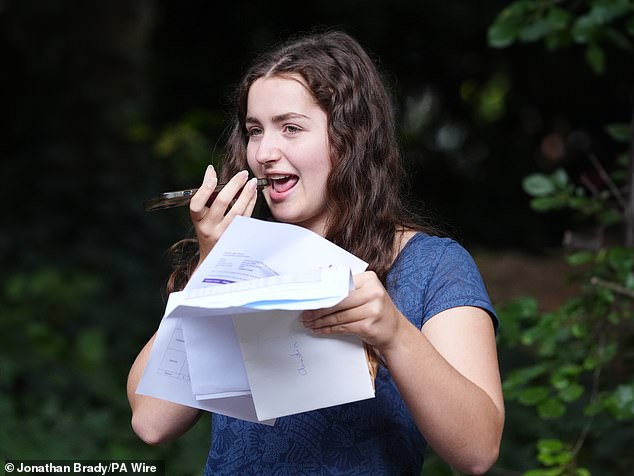
Celebrations for Claudia Parry-Jones, 15, at Putney High School in London
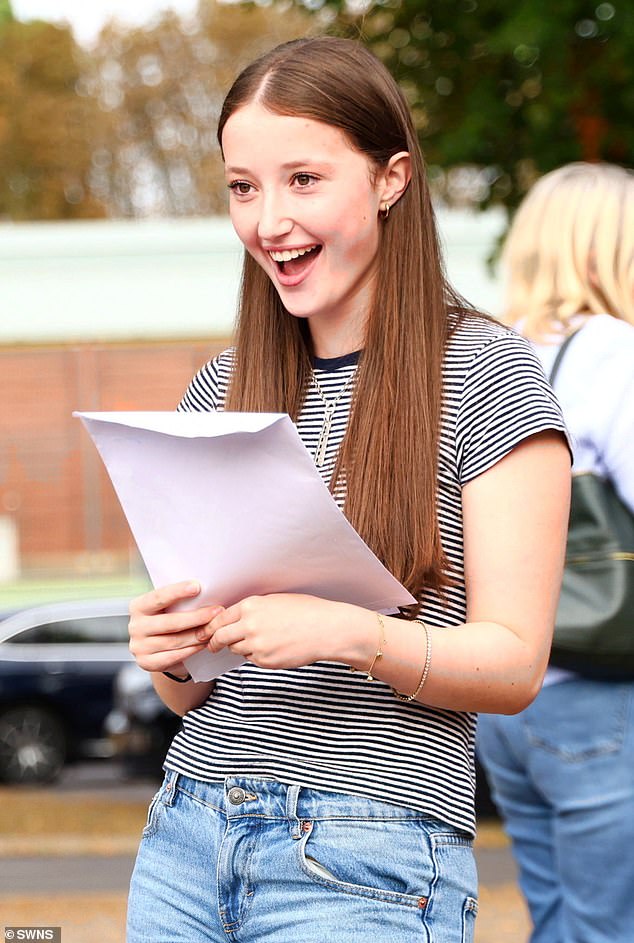
Students receive their GCSE results at Redmaids’ High School in Bristol
Pepe Di’Iasio, general secretary of the Association of School and College Leaders, said: ‘These students experienced a great deal of disruption earlier in their time at school as a result of the Covid-19 pandemic.
‘Schools strained every sinew to support those who have needed additional help to catch up and to tackle the lingering impact of the pandemic on attendance rates. However, it has not been easy, and the previous government did not put enough investment or focus into educational recovery.
‘Disadvantaged students were often those most severely affected by the disruption of Covid and that has made it even more difficult to close gaps in educational attainment caused by socioeconomic factors.
‘Those gaps are reflected in regional disparities evident once again in this year’s results.
‘Once again we see that the majority of students who retake GCSE English and maths in post-16 education under a government policy of mandatory resits continue to fall short of a grade 4 standard pass.
‘It is utterly demoralising for these young people and there has to be a better way of supporting literacy and numeracy.’
Paul Whiteman, general secretary of school leaders’ union NAHT, said the current GCSE resit policy is ‘not fit for purpose’.
He added: ‘NAHT has long called for reform of the current policy that forces students into repeated resits, which is demotivating and ineffective.
‘What is needed are more appropriate and engaging alternatives to GCSEs in English and maths at KS4.’
While traditional A*-G grades are used in Northern Ireland and Wales, in England these have been replaced with a 9-1 system, where 9 is the highest.
A 4 is broadly equivalent to a C grade and a 7 is broadly equivalent to an A.
In England, many students who do not secure at least a grade 4 – which is considered a ‘standard pass’ – in English and/or maths GCSE are required to retake the subjects during post-16 education.
Overall UK entries for GCSEs have dropped slightly – down 0.4 per cent on 2024, according to JCQ data.
A breakdown of the data shows that while 16-year-olds still make up the vast majority of students taking GCSEs, entries from this group are down 1.4 per cent on last year.
Entries from students aged 17 and over are up 12.1 per cent to 482,402 compared with 430,377 in 2024.
Education leaders have called for the Government’s policy of compulsory resits in the two subjects at GCSE to be scrapped.
Jill Duffy, chief executive of OCR exam board, said: ‘Nearly a quarter of GCSE maths and English entries are resits. This is an all-time high.
‘Less than a fifth of resitting students achieved the grade 4 they need to break out of the resit cycle. This is a resit crisis.
‘Tinkering at the edges of policy won’t fix this. We need fundamental reform to maths and English secondary education – especially at Key Stage 3 – to support those who fall behind in these crucial subjects.’
She added of the gender gap: ‘Boys are slowly catching up with girls, but the GCSE attainment gap remains significant.’
More than 360,500 Level 1 and 2 vocational and technical qualification (VTQ) results have also been awarded to pupils.
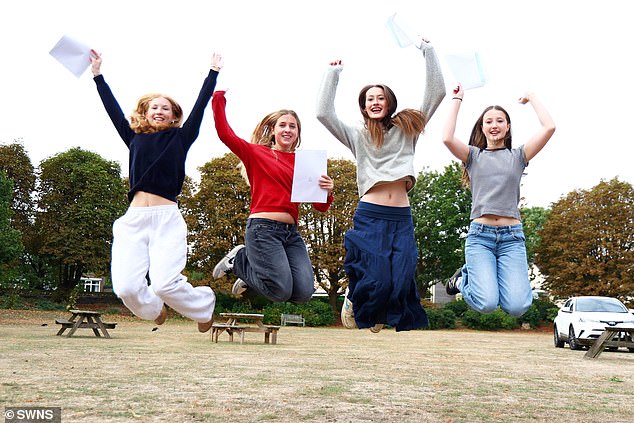
Students receive their GCSE results at Redmaids’ High School in Bristol
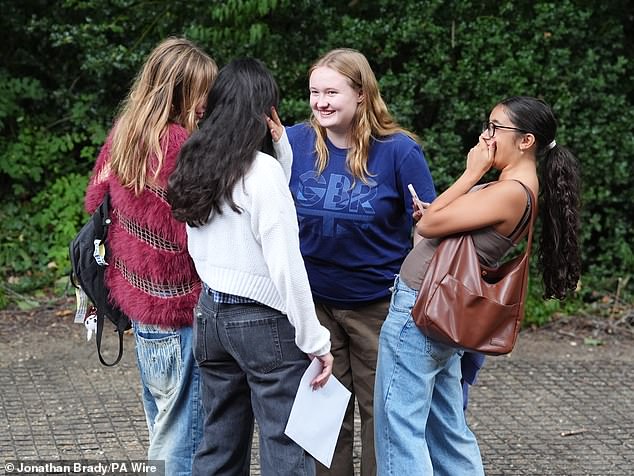
Pupils at Putney High School in London receiving their GCSE results
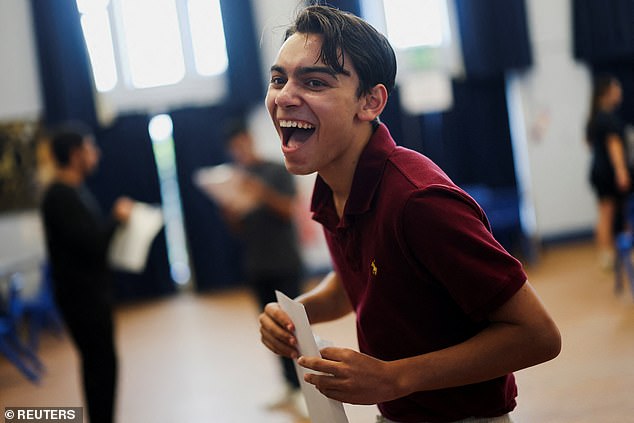
Eesa Delaney, 16, a student at Harris Academy Merton, reacts as he collects his GCSE results
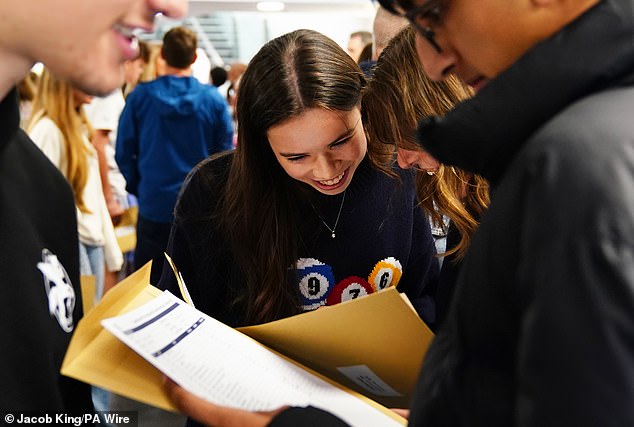
Pupils at Solihull School in Solihull receiving their GCSE results

Pupils celebrate at St Dominic’s in Belfast
Grade inflation was rife during the New Labour years, when officials repeatedly insisted that pupils genuinely were getting cleverer every year.
The proportion of top grades rose every single year between 2002 and 2011.
However, after the Tories won the election in 2010 they instructed Ofqual to make sure the proportion getting these top grades remained roughly the same each year.
This is adjusted slightly for the ability of each cohort, which is measured by sample tests earlier in the year.
Roughly one in five have got A/7 grades over the last 15 years, but the pandemic frustrated the regulator’s efforts because teacher assessment led to massive grade inflation.
While grades have now been brought back down they are still higher than before the disruption.
This morning’s results also show Ireland’s pupils performed better than other nations, part of a long-term trend.
In terms of top grades, 31.6 per cent of students achieved at least a 7 or an A grade and above, compared to 31.0 per cent last year.
Experts have previously attributed the trend to the fact that the nation has retained the grammar school system.
In England, there are only 161 left, as most either turned into comprehensives or private schools over the course of successive Governments.
The dismantling of England’s grammar school system was due to criticism that selecting at 11 is unfair.
However critics have said it has led to an erosion of standards.
From warzone to straight 9 grades for brave Ukraine pupil
Terrified and traumatised, Liza Minenko spent two weeks hiding in their basement in Kyiv before fleeing the Ukraine war with her family and pet dog Daisy.
Arriving in the UK, she was lucky enough to be awarded a full scholarship at the prestigious £45,000-a-year Brighton College.
Now, just three years later, she is celebrating after scooping seven grade 9s and one grade 8 in her GCSEs.
It is an astonishing feat for the 16-year-old who was also given a special award for achieving 100 per cent in her Art GSCE.
After being awarded a full 120 per cent scholarship, Liza threw herself into college life while making sure the war was in the forefront of everyone’s minds.
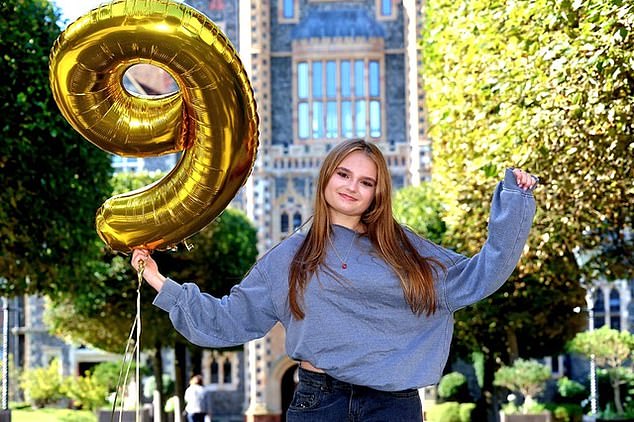
Ukrainian student Liza Minenko scored almost all 9 grades at Brighton College
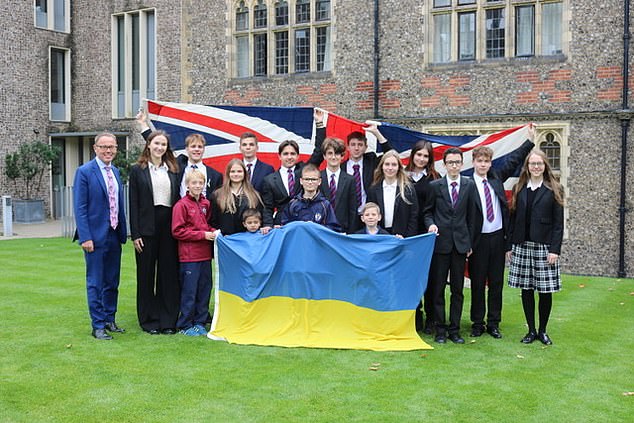
Lisa Minenko and other Ukrainian scholarship pupils at Brighton College with (on left) principal Richard Cairns
She and her family are hoping recent talks of peace will come to fruition and they will be able to return to their home.
Liza was one of 23 Ukrainian boys and girls given free places at Brighton College, including her siblings.
Liza said she was delighted with her results but said the the war in Ukraine was never far from her thoughts.
She said: ‘You need a lot of strength to live in a country that is in a state of war. You also need a lot of strength when you have to leave behind your home country and everything and everyone you know.
‘We need to keep reminding people that there is still a devastating conflict happening in our home country.’
After opening her results she said: ‘I was nervous, but I am happy. I have mixed feelings. I want to go back to Ukraine but we are all really scared to go back to Kyiv. I haven’t seen my grandparents for years since the start of the war.’
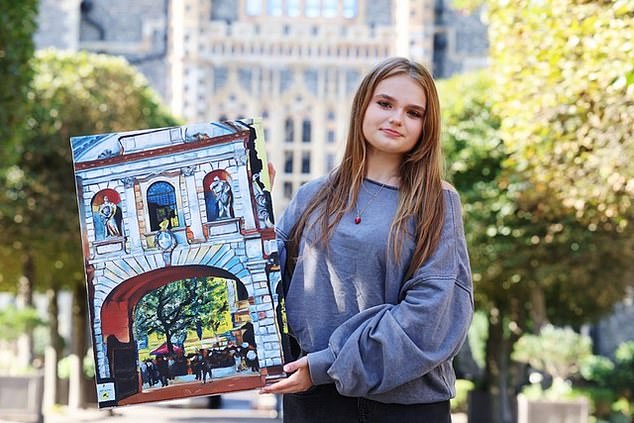
Ukrainian student Liza Minenko with her artwork
The family lived in their basement in Kyiv for two weeks at the start of the war and were traumatised. They travelled across Europe along with their dog Daisy and finally made it to the UK.
Liza’s mother Luda Zburzhynska said: ‘The war forced our family, like so many Ukrainians, to leave our home. We came to England for our children’s education.
‘But at the same time, it led us to Brighton College. This amazing school has become more than just an educational institution to us – it has been a place where we felt humanity, acceptance and warmth.’
Liza hopes to go on and do well in the future and will be staying at Brighton College to complete her A Levels.
Head Master, Steve Marshall-Taylor said: ‘Among so much of which we can be proud today, this wonderful individual story shines brightly and highlights the privilege we have to play a small part in moments such as this.’
Brighton College was quick to react when the war in Ukraine started, reaching out to the community to offer 23 scholarships, plus the support needed by these young refugees arriving into the UK, many of them alone.
Following their record-breaking A-level achievements last week, pupils at Brighton College are once again celebrating — this time with the school’s best-ever GCSE results.
An astonishing 98 per cent of all grades were at 9–7 (A*–A), including 62 per cent at grade 9, and 89 per cent at grade 8-9 (A* equivalent).
In total, pupils secured 1,300 grade 9s, with 59 pupils achieving a clean sweep of 9 or more grade 9s.


